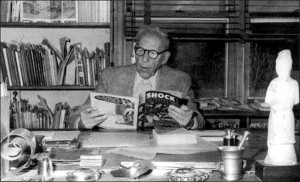A couple of weeks ago, researcher Carol Tilley proved to the world what many already suspected: anti-comics crusader Fredric Wertham lacked supporting scientific evidence for his conclusions and even fabricated some of his data. This week, Tilley wrote an eloquent article that reveals how she came to research Wertham and her own reservations about revealing her discoveries.
Tilley was one of the first people to be given access to Wertham’s research notes and mansucript drafts, which comprised some 200 boxes in the Library of Congress. She set out to examine the relationship among libraries, comics, and kids, but she stumbled upon an entirely different topic. Tilley writes for BoingBoing:
By the end of my first day using Wertham’s collection, I realized that there might be a different story than the one I wanted to tell. Looking at the sources Wertham used in putting together Seduction of the Innocent, I saw inconsistencies. The more I looked, the more I found. Some evidence was unadulterated, but some was. I collected examples and made several more trips to use the collection. I never did find the abundance of letters from librarians that I thought I would find, but I continued to find changes, especially in quotations from young patients, that I found troubling.
Tilley admits that she was initially hesitant to write about her concerns:
For many hard-to-articulate reasons, I didn’t want to write the scholarly paper on Wertham and the problems I found in his evidence, but not to write it seemed a disservice to the young people whose words and experiences Wertham distorted to help make his case against comics. That many of these young people were socially and culturally marginalized – living in poverty, abused, of color, learning disabled, and the like — makes it more important to correct the record.
You can read the entirety of Tilley’s article for BoingBoing here. Tilley’s work has cast a light on Wertham, whose crusade against comics led to decades of self-censorship that nearly destroyed the industry (and certainly destroyed the livelihoods of hundreds of comics creators and publishers). While few were surprised that Wertham used faulty science to support his arguments and Wertham’s views may even seem quaint by today’s standards, they’re no less dangerous. As you can see by our coverage of the video game brouhaha, such vocal and unfounded mistreatment of Constitutionally-protected entertainment still happens today. It even still happens to comic books, which is why CBLDF’s work is as important today as it ever was.
Please help support CBLDF’s important First Amendment work and reporting on issues such as this by making a donation or becoming a member of the CBLDF!
Betsy Gomez is the Web Editor for CBLDF.
